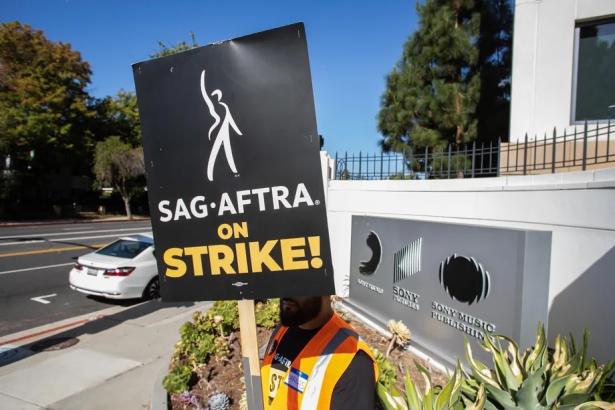Alissa Wilkinson covers film and culture for Vox. Alissa is a member of the New York Film Critics Circle and the National Society of Film Critics.
_____
The Hollywood writers strike officially ended on Tuesday, October 10, when the Writers Guild of America (WGA) voted to ratify its contract with the AMPTP (the organization that represents Hollywood’s major studios and production companies). But the actors are still very much on the picket line — and there’s no clear end in sight.
SAG-AFTRA — the 160,000-member union that represents Hollywood’s actors and performers — has been in talks with the AMPTP (Alliance of Motion Picture and Television Producers) since October 2. But late in the evening on October 11, the AMPTP released a statement announcing that talks had been suspended, illuminating the first of two major sticking points in the negotiations.
“It is clear that the gap between the AMPTP and SAG-AFTRA is too great, and conversations are no longer moving us in a productive direction,” the AMPTP’s statement read. The studios laid out their proposals in the statement, highlighting SAG-AFTRA’s demand for a “viewership bonus” that the studios claim would cost an additional $800 million per year, an “untenable economic burden.”
The viewership bonus would increase compensation for performers whose projects are very successful, a measure that would require the studios to make public the viewership for streaming content — something they’ve resisted.
But it seems there’s another major issue at play, in addition to issues of compensation. In the wee hours of October 12, SAG-AFTRA released its own counterstatement, in which the union said that the AMPTP had “presented an offer that was, shockingly, worth less than they proposed before the strike began.” The union also accused the AMPTP of having “misrepresented to the press the cost of the above proposal — overstating it by 60%.”
Yet, according to SAG-AFTRA, the AMPTP’s proposal also “claim to protect performer consent,” but would “demand ‘consent’ on the first day of employment for use of a performer’s digital replica for an entire cinematic universe (or any franchise project).” This has been a sore point since the strike began in July. At the press conference announcing the start of the strike, the union’s National Executive Director and Chief Negotiator Duncan Crabtree-Ireland said that the AMPTP’s proposal for AI “proposed that our background actors should be able to be scanned, get paid for one day’s pay, and their company should own that scan, their image, their likeness and to be able to use it for the rest of eternity in any project they want with no consent and no compensation.” Many of SAG-AFTRA’s members rely on income from working as a background actor (the industry’s term for “extras”) or in minor roles; a proposal like this would severely cut into that work.
For now, talks have been suspended. But as the industry inches toward Oscar season and the content well dries up, both sides of the negotiation feel mounting pressure.
While SAG-AFTRA is on strike, actors do not perform in or promote struck work. While the union has granted waivers to non-AMPTP projects, the usual star-studded red carpets at fall festivals have been considerably less crowded, and some movies (such as Dune: Part Two) have moved out of the fall schedule altogether. Until SAG-AFTRA and the AMPTP come to an agreement, things are at a relative standstill.
Yet, like the WGA — which won nearly everything it asked for after the second-longest strike in its history — SAG-AFTRA says that this is an existential moment for their profession, an inflection point in determining whether acting will be a profession going forward. If the writers strike demonstrates anything, this may, in the end, be a waiting game.
Will you support Vox’s explanatory journalism?
Most news outlets make their money through advertising or subscriptions. But when it comes to what we’re trying to do at Vox, there are a couple reasons that we can't rely only on ads and subscriptions to keep the lights on.
First, advertising dollars go up and down with the economy. We often only know a few months out what our advertising revenue will be, which makes it hard to plan ahead.
Second, we’re not in the subscriptions business. Vox is here to help everyone understand the complex issues shaping the world — not just the people who can afford to pay for a subscription. We believe that’s an important part of building a more equal society. We can’t do that if we have a paywall.
That’s why we also turn to you, our readers, to help us keep Vox free. If you also believe that everyone deserves access to trusted high-quality information, will you make a gift to Vox today?


Spread the word